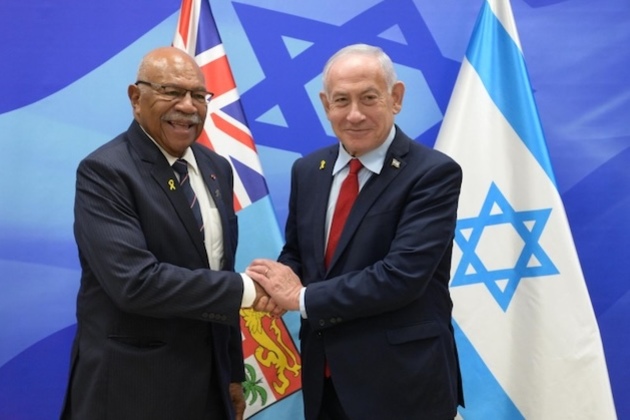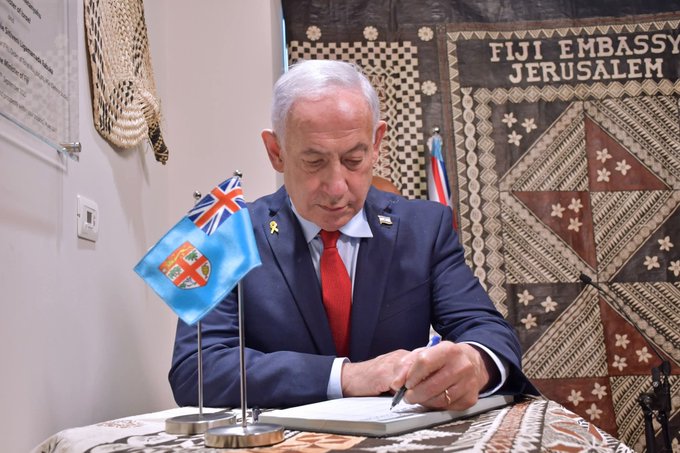Move FM Australian News

Fiji defies global shift, opens embassy in Jerusalem
Sep 22, 2025JERUSALEM – In a move that has sparked international debate, the Republic of Fiji has officially opened its embassy in Jerusalem, aligning itself with Israel’s long-standing claim to the city as its exclusive and eternal capital. The opening on Wednesday of last week, came just days ahead of a historic announcement by the United Kingdom, Canada, and Australia, which jointly declared they will formally recognise the State of Palestine at the United Nations General Assembly this week.
Fijian Prime Minister Sitiveni Rabuka was present in Jerusalem for the inauguration ceremony alongside Israeli Prime Minister Benjamin Netanyahu and Israeli Foreign Minister Gideon Saar. The ceremony, held just outside the ancient walls of Jerusalem’s Old City, marked Fiji as the seventh country to establish its diplomatic mission in the contested city.
A Divisive Moment on the World Stage
While many nations continue to maintain embassies in Tel Aviv due to the unresolved status of Jerusalem, Fiji’s move was hailed by Israeli leaders as a bold affirmation of their historical and spiritual claims.
“This is more than a political moment. It’s a sharing of great values and great purposes,” Prime Minister Netanyahu said during the dedication. “You’re opening an embassy in the ‘City on the Hill,’ the city of Jerusalem. Here, next to the walls of our ancient city, the prophets spoke, the kings of Israel ruled, and some of the greatest insights of human faith and values were inscribed here.”
Netanyahu praised Rabuka, who led the first of a number of coups in his country, as a “soldier of peace” and emphasized the long-standing friendship between the two nations, despite their geographical distance.
“We are together over the years, in many great issues, and the first one is peace,” he said. “You were in a peace-keeping force. The idea of peace, peace between nations, peace between men and women around the world… That is a bedrock of our common faith and our common values.”
Global Contrasts: Recognition of Palestine Looms
The embassy opening comes at a highly sensitive diplomatic moment. On Sunday, the United Kingdom, Canada, and Australia jointly announced their intention to recognise the State of Palestine at the UN General Assembly this week, marking a significant shift among Western powers. The move is seen as part of a renewed push to revive the stalled two-state solution and support Palestinian aspirations for statehood.
Fiji’s decision, by contrast, appears to reinforce Israel’s position on Jerusalem and diverges sharply from the growing international momentum toward Palestinian recognition.
A Symbolic and Strategic Gesture
In his remarks, Netanyahu underscored the symbolic significance of Fiji becoming the seventh country to open its embassy in Jerusalem, noting the importance of the number in Jewish tradition.
“Only one time you can be seventh. Then comes eighth, ninth; seven is an important number, it’s a symbolic number in our tradition,” the Israeli Prime Minister said. “The fact that you have come here, and you have put your embassy in Jerusalem… you recognize a truth that everybody should recognize, but few governments have so far. That this has been our capital for 3,000 years, since the days of King David.”
:But we are together over the years, in many instances, in many great issues, and the first one is peace. You mentioned it. You were a soldier of peace. You were in a peace-keeping force. The idea of peace, peace between nations, peace between men and women around the world. That idea that all human beings are endowed with the right to live, the right to be free, the idea that slavery wasn’t permanent,” the Israeli PM said.” t’s very important that we brothers help one another. I’m proud of the fact that we have been involved in the development of Fiji.”
He closed his remarks with a personal welcome to Prime Minister Rabuka: “Welcome to our house, Mr. Prime Minister, which is your house and the house of the people of Fiji.”
Rabuka, in a video clip posted on Facebook on Sunday said the decision to establish an embassy in Jerusalem was a government decision, although he said he decided on the move back in the 1990s, following the two coups he led in 1987, when the U.S., Australia and New Zealand withdrew defence cooperation. “Fiji had to continue to man our peacekeeping batallians and equip them. Israel was one of those that stepped forward. They provided patrol boats, sub machine guns and weapons to continue our obligations to international peacekeeping,” he said.
When the move was announced earlier thsi month, the Fijian government said in a statement it would receive financial assistance in the establishment of the embassy.” Fiji appreciates the hospitality and on the ground support offered by its hosts for elements of the visit and the mission’s establishment. This is consistent with Israel’s cabinet decision to provide financial assistance to countries relocating embassies to Jerusalem,” the statement said.
Prime Minister Rabuka at the time said:”“This mission is about constructive engagement. An embassy is not a blanket endorsement of another country’s policies; it is a bridge that allows Fiji to work directly with partners, share our Pacific perspectives, and pursue practical cooperation that benefits our people.”
Reactions and Implications
While Israeli officials celebrated the embassy’s opening, critics argue that the move could further inflame tensions in the region, particularly as global attention turns to the UN and the question of Palestinian statehood.
Palestinian officials condemned the Fijian move as undermining international law and the consensus that the final status of Jerusalem should be determined through negotiations. No formal response has yet been issued by the Palestinian Authority, but diplomatic sources suggest protests may be raised at the UN this week.
As the geopolitical fault lines continue to shift, Fiji’s decision marks a significant and controversial stand on one of the most contentious issues in international diplomacy — one that places it in firm alignment with Israel at a moment when many of its traditional allies are moving in the opposite direction.



